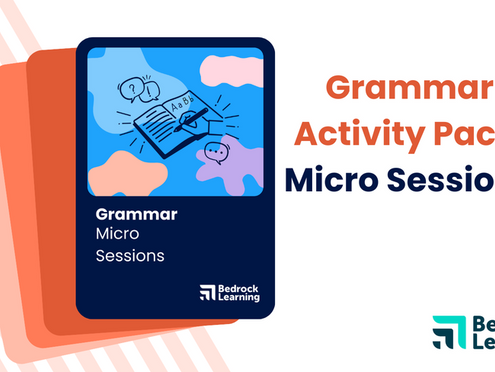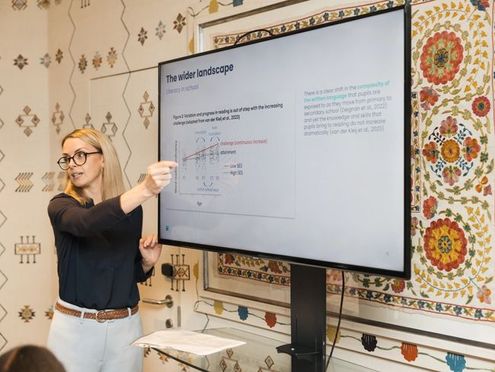How Bedrock is designed to help learners make literacy progress
When reading, learners who are given material which is too easy may lose motivation due to the lack of challenge, while learners given texts which are too hard struggle to access the learning material.
That's why Bedrock Vocabulary starts with an alpha test. This test helps to place learners in the block best suited to their ability. A Year 8 learner may typically be placed in Block 8, but the alpha test accurately places them into the block where they will make most progress. This ensures that the prose and activities learners are given on Bedrock Vocabulary is challenging yet accessible, promoting a love of reading.
Bedrock’s deep-learning algorithm keeps track of words learners already understand, words they have learnt and words they are currently learning. Learners are tested monthly on the words they have learnt to retain long-term understanding and monitor progress. If these words are forgotten, they are moved back into “words I am learning” and retaught for mastery.
How Bedrock records learners' progress
Progress on Bedrock is determined as the difference between a learners’ pre-test and post-test results.
Progress can be broken down into the improvement of one particular learner, even how they fared on different topics and activities, or it can be viewed over whole classes and cohorts - even your whole school.
As well as this, learners’ progress can be broken down into micro-population demographics such as gender, SEN, PP and more to allow for detailed analysis of progress made over time.
Bedrock’s blocks are broken into topics, which are again broken into lessons. As learners complete two lessons a week, data is collected frequently, compiling a detailed view of the progress each learner makes.
This data is collated automatically through Bedrock’s self-marking system, providing teachers with high-quality analysis while saving time. This data, collected from lessons and tests, is available instantly for teachers, parents and learners to view. It is also shared as a monthly progress report into the lead Bedrock teacher's inbox.
The statistics and outcomes of using Bedrock Vocabulary
Bedrock Vocabulary's impact on vocabulary development was tested by an external statistician with a sample size of 84,000 - Bedrock's impact was shown to be statistically large across every demographic, with an average improvement of 30%.
The demographics of learners that benefited most from using Bedrock Vocabulary were primary-age learners and SEN students, making 48% and 43% progress respectively.
93% of all Bedrock Vocabulary learners made progress after completing just five topics - this improvement increased after 10 topics.
This progress was not only showed through data such as tests and marks, but also through the confidence and enthusiasm of the learners.
A parent at Birchwood School said, "As my child works through the Bedrock topics, I can see that she is making progress. It does wonders for her confidence!"
The probability that these results occurred due to chance was calculated to be 0.0001, which very strongly suggests that these findings were directly related to the learners’ use of Bedrock Vocabulary, not just chance or natural improvement.
These statistics confirm what we know at Bedrock Learning to be true - Bedrock Vocabulary boosts learners' literacy skills with just two lessons per week. Ultimately, this helps to close language gaps between learners, and gives every learner the opportunity to thrive through literacy improvement.




